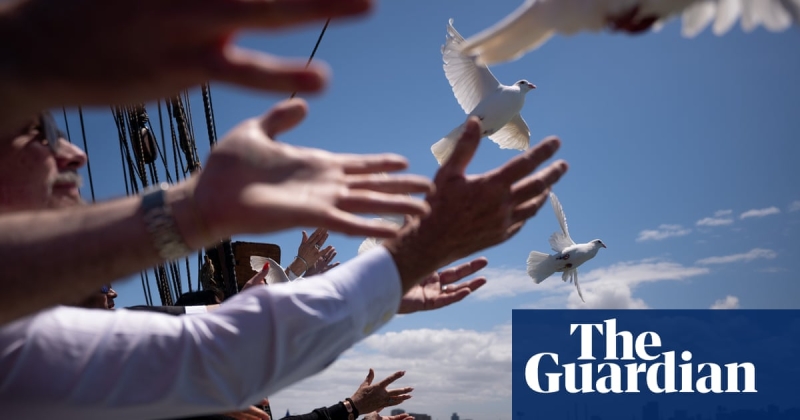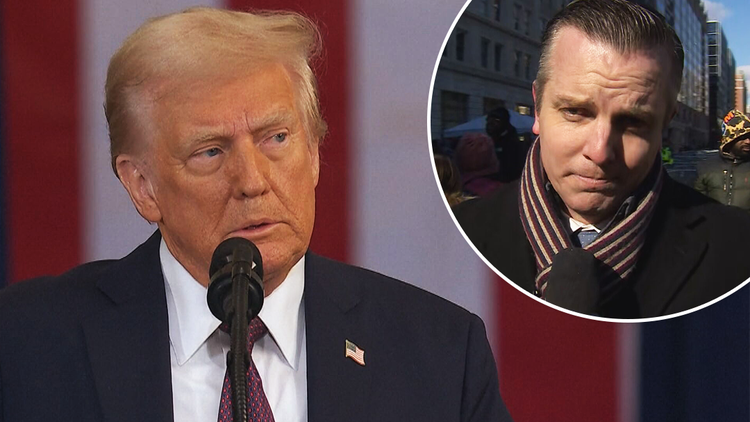The not-for-profit Sustainable Funerals Group honours the passing of people with forgotten ashes by sending them out to sea
From the deck of a 27-metre sailboat bobbing in Port Phillip Bay, Kieran Worthington takes in the distant view of Melbourne’s skyline. The sun beats down, birds fly overhead.
Then Worthington takes off his suit jacket and starts tipping people’s remains overboard.
With each box of ashes, Worthington and his team from Sustainable Funerals Group read out the name and date of death of the person who has died before sending them out to sea.
“It’s gritty and it’s real,” Worthington says as he stands on board the Enterprize. “But this is our way of honouring their passing.”
Every year unclaimed ashes are left in funeral homes and crematoriums across the country. They create a conundrum – what do you do with them? Some funeral homes hold them in storage indefinitely – some ashes are 100 years old, in tins instead of plastic tubs. Other homes bury unclaimed ashes together.
Andy Ward, who is the founder of White Angel Doves, a company that releases doves at events, realises he has picked up the oldest box of unclaimed ashes on the boat – a young man who died in 1997.
“That makes me feel honoured,” he says.
Ash fills the air. As it’s picked up by the wind, it circles around the boat. It gets in places it shouldn’t before being carried out into the bay.
A father, hands gripping the bannister, follows it with his eyes. He’s on board with his partner to send off their baby who was stillborn.
The Michieli family are also on board, spreading the ashes of their 90-year-old neighbour, Audrey.
On their son, David’s seventh birthday they went on the Enterprize with Audrey. Fifteen years later she called David, asking if he would come on a “practice run” on the boat from which she one day hoped to have her ashes spread.
“She felt a connection to the journey of coming into Australia on ship,” he says.
“Fast forward 10 years, unfortunately here we are. It’s quite an honour. She loved the ship, she loved what it represented … the memories.”
Ward hands out 10 doves to those on board. They are released at the same time before flowers are scattered on the water’s surface . Orinoco Flow by Enya plays in the background.
Sustainable Funerals Group have tried to contact each of the 75 families multiple times. Sometimes people don’t answer their phones, sometimes there’s no one to collect the ashes. Many are too bereaved to return.
“We find that when people lose someone, sometimes they’re so overwhelmed they can’t bring themselves to come back and pick the ashes up,” Worthington says.
“We contacted them wherever we can. Some of these, contact was lost years ago.”
Sustainable Funerals Group is not-for-profit orgsanisation and the families they help are going through financial hardship. Often the families can’t afford funerals. Between 2019 and 2024, funerals increased 20% to $18,652 for a basic burial funeral, and up to $5,953 for a basic cremation, according to research done last year by insurance provider Australian Seniors.
When Worthington’s father started the charity he would just spread unclaimed ashes in the bay by himself. Now, they do this boat ceremony every few years – accompanied with florists, the doves – one time, they were joined by someone with bagpipes.
Regulation around unclaimed ashes varies between jurisdictions, but generally, they have to be kept by funeral homes and crematoriums for a year.
The CEO of Australasian Cemeteries and Crematoria Association, Ben Kelly, says in some parts of the country 85% of people now get cremated.
“Australia is trending more towards cremation,” he says. “If you compare to the US, they’re only just getting close to 50% now.”
Kelly says while most capital cities would sit about 80%, Sydney and Melbourne would have a lower proportion because of the high number of citizens from European backgrounds who prefer burials, such as Catholics and Jews. Some remote areas won’t have access to a crematorium.
While the trend to cremation is about a less traditional approach to death, it’s often driven by cost – with burials costing upwards of $10,000, he says.
Craig Stevens, director of Timeless Funerals in Sydney, says the majority of people will collect their loved ones’ ashes. He has about 30 ashes that go back to 2008 – many of them are “pauper burials” where there is no next of kin or the family has not been able to afford to pay.
Stevens said he holds the ashes until someone gets in contact – he won’t dispose of them or scatter them.
“I haven’t scattered any ashes because I don’t know it’s my right to do that,” he says.
“I’ll maintain them until they are either claimed or the day I drop.”





